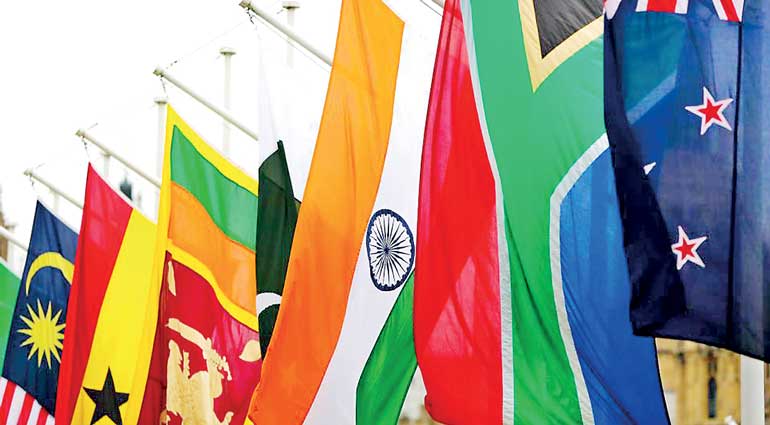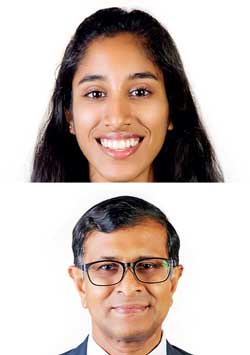Saturday Feb 21, 2026
Saturday Feb 21, 2026
Tuesday, 9 January 2018 00:00 - - {{hitsCtrl.values.hits}}

By Myra Sivaloganathan and Ganeshan Wignaraja
A landmark meeting of the leaders of Commonwealth countries will be held in London in April 2018. This presents Sri Lanka with an opportunity to play a key role in an international organisation that may have new relevance in the changing global order. In particular, Sri Lanka can work to promote intra-Commonwealth trade, women’s employment and leadership, the empowerment of youth, and democratic values.
The renewed relevance
of the Commonwealth
The Commonwealth of Nations may be more politically and economically significant in the post-Brexit world order. While nationalism, populism, and isolationism and protectionism are rising globally, the Commonwealth could emerge as both a force for political stability and an engine of international trade, for Britain and the rest of the Commonwealth.
Most of the Commonwealth’s 52 member countries share democratic values and institutions. In addition, the Commonwealth Charter lists among its core values a strong rule of law, human rights, the promotion of sustainable development, and the strengthening of democracy. More informally, business ties and traditions also bind Commonwealth countries.
Upcoming CHOGM
in April 2018
A Commonwealth Heads of Government Meeting (CHOGM) is held every two years. The bi-annual summit allows Commonwealth leaders to (i) review the dynamics of international politics and economics, (ii) strengthen cooperation among Commonwealth states through economic and diplomatic initiatives, and (iii) examine new avenues for Commonwealth states to cooperate in development.
Sri Lanka hosted the 23rd CHOGM in 2013 in Colombo, where Commonwealth heads of government adopted the Colombo Declaration on Sustainable, Inclusive and Equitable Development, and the Kotte Statement on International Trade and Investment.1 The 25th CHOGM will be held in London in April 2018, during which the UK will become chair of the Commonwealth from 2018-2020.
Opportunities for Sri Lanka at the 25th CHOGM
At the 25th CHOGM 2018, Sri Lanka could usefully promote four initiatives, each of which would strengthen Sri Lanka’s soft power and lead to useful economic and political outcomes.
(i) Facilitating intra-Commonwealth trade
First, Sri Lanka should push to examine ways to increase intra-Commonwealth trade. The coming implementation of Brexit means that Britain will no longer enjoy comparable trading arrangements as other EU members. Discussions on a future trade agreement between Britain and the EU are complex, and may eventually yield a limited free trade agreement (FTA). The loosening of Britain-EU trade relations is a potential opportunity for increased trade within the Commonwealth.
Commodities like tea, coffee, rubber, spices, metals, and minerals will continue to dominate intra-Commonwealth trade for the foreseeable future. Trade in traditional services like tourism, banking, and insurance will also be prominent. These forms of trade will gradually expand after Brexit due to historic specialisation and demand conditions; a common legal framework of the common law; UK accounting practices; and the widespread use of English as a common business language. CHOGM 2018 should give due recognition to the role of these institutions as a basis for intra-Commonwealth trade.
Moreover, a proactive approach will help promote trade in modern services, as the new frontier in intra-Commonwealth trade. A host of exciting new services (including electronic commerce, information technology services, professional services, creative industries, green services, and services linked to global value chains) fall under this heading.
Sri Lanka at CHOGM 2018 could recommend a regular forum of the Ambassadors from Commonwealth countries at the World Trade Organization (WTO), to discuss regulatory barriers to the growth of modern services trade in Commonwealth member states. The role of the Commonwealth Business Council should also be expanded to encourage business-to-business forums on modern services trade. A future step could be a plurilateral trade agreement for modern services trade (or a few select activities) among like-minded Commonwealth countries.
(ii) Promoting women in the labour force
Second, Sri Lanka should support at CHOGM 2018 women’s participation and leadership in the labour force. The Commonwealth Women Leaders’ Summit acknowledged women’s under-representation in many segments of the labour market, and the need for inclusive growth.2 Likewise, Sri Lanka’s Female Futures Forum recently promoted female leadership as entrepreneurs and in the private sector. Sri Lanka could propose establishing a forum of Commonwealth Female Business Leaders, as a key grouping within the Commonwealth Business Council (CBC). This leadership initiative could act as a conduit between business and the government, promoting female participation in both sectors throughout the Commonwealth, while also promoting Sri Lanka’s soft power on gender issues.
Studies have shown that the presence of women in corporate leadership leads to positive firm performance. For profitable firms, a move from no female leadership to 30% representation is associated with a 15% increase in net revenue margin.3 Female corporate leaders contribute to superior firm performance through: (i) greater diversity of skills in management, and (ii) less gender discrimination in management, which helps with recruiting, promoting, and retaining talent. An initiative for Commonwealth Female Business Leaders, led by women corporate leaders around the Commonwealth, would ultimately facilitate sustainable growth and investment.
(iii) Empowering youth
Third, Sri Lanka should wholeheartedly support a key focus of CHOGM 2018: youth empowerment and equality. As Theresa May has said, “Young people [will be] at the heart of the Commonwealth Heads of Government Meeting in London.”4 Approximately 60% of Commonwealth nations’ two billion citizens are under the age of thirty; however, youth account for 50% of unemployment globally.5 Given this overwhelming and risky demographic, Sri Lanka must address barriers to the growth and success of young people at CHOGM 2018.
As the Commonwealth Youth Forum that will be part of CHOGM 2018, Sri Lanka may wish to focus on how youth can become more deeply involved in policy-making, and how youth programmes can help combat current trends of nationalism, populism, and isolationism. Furthermore, youth leadership should not be limited to occasional summits; CHOGM 2018 should examine how youth can engage with their parliamentarians on a regular basis, to present their voices and views on a range of issues. Youth empowerment will remain a hollow slogan without the highest levels of political commitment, as well as active and well-run schemes to implement that commitment.
(iv) Sustaining democratic values and the rule of law
Fourth, Sri Lanka should emphasise democratic values at CHOGM 2018. In a time when populism and authoritarianism appear on the rise, Commonwealth countries should publicly recommit to their democratic institutions. This in turn can ensure a free and responsible media.
Good governance and media freedom are mutually dependent; when the journalists can report freely, a nation can be confident that its decision-makers are held to high standards.6 Sri Lanka’s government amended the constitution in 2015 to promote democratic values, and recently guaranteed the right to access government information.7 CHOGM 2018 is an opportunity for Sri Lanka to show its own commitment to democratic values, and to support cooperation among member states to make good on collective commitments, and ensure dissent is not handled with repression and violence.
Finally, at CHOGM 2018, member states should refocus on a key feature of almost all Commonwealth nations – the common law – and evaluate how it supports the rule of law. The Commonwealth aims to build, support and strengthen legal systems in member countries. It promotes the rule of law to build lasting democratic institutions that enable citizen participation in local and national government.8 Independent judiciaries must be strengthened to protect fundamental rights and also, to enable business disputes to be resolved fairly and efficiently and an investment-friendly environment.9 In short, the legal realities of Commonwealth nations must be examined, to uphold both democratic stability and economic development.
CHOGM 2018 and the future of the Commonwealth
There is little doubt that CHOGM 2018 should take a firm stance against the powerful forces of nationalism, populism, and isolationism that are at odds with Commonwealth values and traditions. While the Commonwealth is unlikely to transform from a political grouping to a liberal economic organisation overnight, CHOGM 2018 can begin to blend the promotion of intra-Commonwealth trade with a reaffirmation of the importance of shared democratic values and institutions. Sri Lanka can make the case for marrying sensible economics with thoughtful politics, to tackle the challenges of a new and uncertain world order.
Footnotes
1 Commonwealth Heads of Government Meeting (2013), CHOGM 2013 Communiqué, The Commonwealth of Nations. http://thecommonwealth.org/sites/default/files/events/documents/CHOGM%202013%20Communique_0.pdf
2 Women Leaders’ Summit (2016), Women’s economic empowerment, The Commonwealth of Nations.
http://thecommonwealth.org/sites/default/files/news-items/documents/Commonwealth%20Women%20Leaders%27%20Summit%20-%20%20Brief%20for%2014%20July%202016.pdf#page=4
3 Noland, Marcus et al. (2016), Is Gender Diversity Profitable? Evidence from a Global Survey, Peterson Institute for International Economics. https://piie.com/publications/wp/wp16-3.pdf
4 The Commonwealth (2017), Commonwealth youth - the ‘gems’ at the heart of CHOGM 2018, Newsroom. http://thecommonwealth.org/media/news/commonwealth-youth-gems-heart-chogm-2018
5 Commonwealth Youth Programme (2007), The Commonwealth Plan of Action for Youth Empowerment, Commonwealth Secretariat. http://www.youthmetro.org/uploads/4/7/6/5/47654969/co._plan_of_action_empowerement_of_youth.pdf#page=16
6 Uku, Richard (2014), In defense of a free press, The Commonwealth. http://thecommonwealth.org/media/news/world-press-freedom-day-message-1
7 Government of Sri Lanka (2016), Right to Information, Parliament of the Democratic Socialist Republic of Sri Lanka. http://www.media.gov.lk/images/pdf_word/2016/12-2016_E.pdf
8 The Commonwealth (2017), Democracy, Our work. http://thecommonwealth.org/democracy
9 European Commission (2017), Rule of law, Justice and fundamental rights. https://ec.europa.eu/info/strategy/justice-and-fundamental-rights/effective-justice/rule-law_en